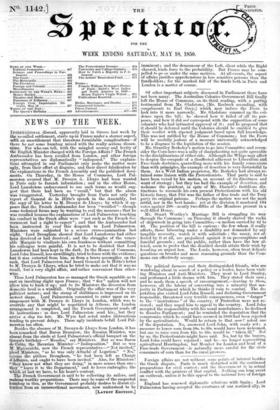Of other important subjects discussed in Parliament there have not
been many. The Australian Colonies Government Bill finally left the House of Commons, on its third reading, with a parting testimonial from Mr. Gladstone, (Mr. Roebuck seconding, with compliments to Earl Grey,) which may induce the Peers to look into it more narrowly. Mr. Gladstone summed up the evi- dence upon the bill : he showed how it failed of all its pur- poses, and how it did not correspond with the supposition of some colonists who had intimated approval of it ; and he proposed that it should be deferred until the Colonies should be enabled to give their verdict with ripened judgment based upon full knowledge. This was not ratified by the Howe of Commons ; but the Peers will be usefully jealous of a measure universally acknowledged to be a disgrace to the legislation of the session. Mr. Grantley Berkeley's motion to go into Committee and recon- sider the Corn-laws was a sally of sharpshooting not quite agreeable to the disciplinarians of either side. Although the Whigs may affect to despise the escapade of a disaffected adherent to Liberalism and Free-trade doctrines, quarrelling more with his family connexions than with principles, the example of desertion is very distasteful to them. As a West Indian proprietor, Mr. Berkeley had always re- tained some liaison with the Protectionists. That party is said to have been vexed by his motion, on account of its directness and want of strategy ; but they too hail the example of desertion, and weloome the penitent, in spite of Mr. Disraeli's fastidious dis- tinctions to reconcile his own present Protectionism with his old historic fancy, that Pitt was the father of free trade and the Tory party- its original patrons. Perhaps the motion was not the most artful, nor in the best hands ; yet at the division it mustered 184 votes against 298—nearly two-fifths of the Members present in a well-filled House.
Mr. Stuart Wortley's Marriage Bill is struggling its way through the Commons : on Thursday it closely shaved the rocks of shipwreck in going into Committee,—a motion carried by 42 to 40. The position of the bill is curious : the few whom it really affects, those labouring under a disability not demanded by any tangible necessity, watch it with solicitude ; the many, not af- fected by it at all, are prejudiced against it on presumptions and fanciful grounds ; and the public, rather than have the law al- tered, seem to prefer that the disabled should attain their wish by breaking an unjust law. The Lords, however, often treat delicate questions on broader and more reasoning grounds than the Com- mons can effectively occupy.


























